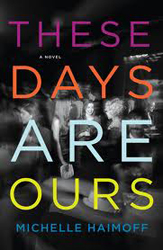Join a community of readers who are committed to Jewish stories
Sign up for JBC’s Nu Reads, a curated selection of Jewish books delivered straight to your door!
 I went to a Modern Orthodox elementary school. For eight years I learned Hebrew (Modern and biblical), participated in Shabbat Onegs and wrote and performed Torah-related songs and plays. I learned every Jewish prayer by heart, wore only below-the-knee skirts and painstakingly studied Talmud in Aramaic in a rabbi’s study. I was impressively Jewish. And then I went to a secular high school and, except for going to temple on the high holidays, attending Passover Seders and lighting the menorah at Hanukkah, I became unimpressively secular. It wasn’t until I met my Catholic-raised husband that I started actively observing Judaism again.
I went to a Modern Orthodox elementary school. For eight years I learned Hebrew (Modern and biblical), participated in Shabbat Onegs and wrote and performed Torah-related songs and plays. I learned every Jewish prayer by heart, wore only below-the-knee skirts and painstakingly studied Talmud in Aramaic in a rabbi’s study. I was impressively Jewish. And then I went to a secular high school and, except for going to temple on the high holidays, attending Passover Seders and lighting the menorah at Hanukkah, I became unimpressively secular. It wasn’t until I met my Catholic-raised husband that I started actively observing Judaism again.
On our first date I told him that if we were to ever have kids, raising them as Jews was nonnegotiable. That’s right, our first date. Religion had come up in previous relationships and I had learned to be firm about what I wanted at the start to avoid surprises later. He nodded and said he would be comfortable with that. Ben believed in the general ritual and ethical guidance of religion even more than he believed in the specifics of his religion. Apparently the extent of two people’s religious belief can affect compatibility more than the religions themselves.
The first thing we decided to do was learn about Judaism together. We signed up for a four month Union for Reform Judaism course. I joked that I could teach it, but once it started I was surprised at how little I already knew. Reform Judaism was everything I had sifted from my Orthodox education without the orthodoxy that had felt so oppressive to me. The liberal politics, reverence for nature and inclusiveness of the community paralleled my own belief system, and Ben and I marveled at how time and again, the laws of Reform Judaism were laws we would create for ourselves if we were creating a religion from scratch. Our class was white, black, Asian, Latino, old, young, gay and straight. We were all there, not by obligation, but by spiritual choice.
Perhaps because of my Orthodox background, I had always been dismissive of other branches of Judaism. I had also become so fixated on the technicalities of being Jewish (matrilineage, for example) that I forgot that religion is a philosophy, and we don’t automatically know or believe in a philosophy just because we’re born into it. If I had simply married another unobservant Jew, we wouldn’t have had to earn our Judaism, it would have already been part of our identities. But Ben and I worked for it, reading, debating and journaling every topic, theme and ritual, from the holidays, to the state of Israel, to the afterlife. I had always assumed that if I were to marry someone who wasn’t Jewish he would take on my religion as his own, but I never realized that in that process of learning about Reform Judaism I would take on a new religion as my own too.
Michelle Haimoff’s debut novel, These Days Are Ours, is now available. She is is a writer and blogger whose writing has appeared in The New York Times, The Los Angeles Times, PsychologyToday.com and The Huffington Post. She is a founding member of NOW New York State’s Young Feminist Task Force and blogs about feminist issues at genfem.com.